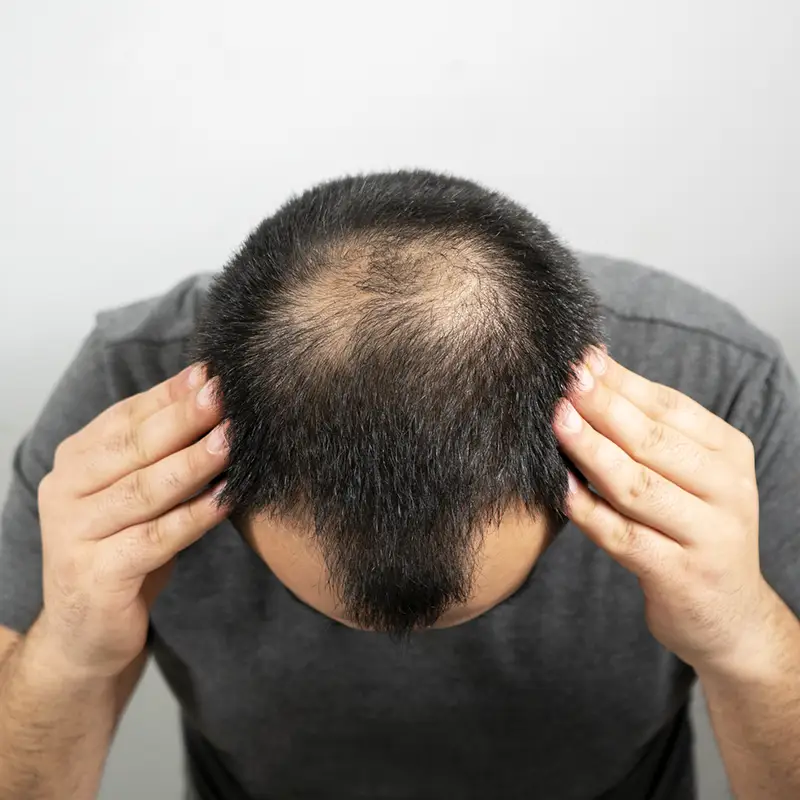Hair Loss
Find Hair Loss Solutions
Do you notice your hair thinning? Does hair fall out in clumps? Hair loss can be very distressing. But it doesn’t have to be that way. We believe the first step to coping with hair loss and regrowing a healthy head of hair is learning what’s causing your hair loss and how to prevent it.

Understanding Your Hair and the Growth Cycle
Before we get into hair loss, it’s important to understand your hair and the hair growth cycle. Your hair consists of two parts – the follicle and the hair shaft. The follicle is buried in your scalp, and contains the living part of your hair, the bulb. The cells of the bulb divide every 1-3 days, faster than any other cells in your body.
The hair shaft is made of a protein called keratin. The protein is already dead, so the hair you can see is not living.
Hair Growth Cycle
There are 4 phases of hair growth: anagen, catagen, and telogen. Not all of your hair is in the same cycle at the same time, which is why most hair loss is random.
The growing phase lasts 2-6 years and determines the length of your hair. About 90% of your hair is in the anagen phase.
This transitional stage that lasts about 10 days. The hair follicle shrinks and detaches from the part of the follicle that stimulates growth
The resting phase lasts around three months. About 10-15% of your hair is in this phase at any given time.
The shedding phase is the tail end of the telogen stage. You shed hair from your scalp.
You lose hair every day, from the time you are a small child through your adult years. If you’re wondering how much hair loss is normal, the average person loses 50-100 hairs a day, while you’re sleeping, washing your hair, styling your hair, etc. But it’s no big deal when you’re growing new hair every day.
What Causes Hair Loss?
Hair loss that is more extensive is known in medical terms as alopecia. This can be gradual thinning of the hair, or losing clumps of hair at a time. The hair loss can be permanent or temporary. There are a lot of factors and conditions that can explain your hair loss. Some of them are easily changeable, while others are hereditary. The cause may also differ based on your sex and age.
Some of the common causes of hair loss include:
- Heredity (androgenic alopecia, including male pattern baldness and female pattern baldness)
- Hormonal changes related to pregnancy, childbirth, menopause, and thyroid disorders
- Alopecia areata (patchy hair loss caused by an autoimmune disorder)
- Ringworm
- A very stressful event (telogen effluvium)
- Certain medications
- Vitamin deficiency
- Certain hairstyles and treatments
Risk Factors for Hair Loss
There are also several things that can increase your risk for thinning hair and hair loss, including:
- Aging
- Losing a significant amount of weight
- Having diabetes or lupus
- Ongoing stress
- Poor nutrition
Except for androgenic alopecia, in most cases, your hair loss is temporary, and will grow back.
Hair Loss in Men
The most common reason for hair loss in men is androgenic alopecia – known as male pattern baldness. Hair can start to thin at the temples and recede from the forehead as early as the teens and 20s. It’s permanent hair loss that affects nearly 70% of men during their lifetime. It’s a genetic condition, passed down through the mother’s side.
Men can also suffer from hair loss due to all of the other causes mentioned above, except for hair loss due to pregnancy or menopause.
Hair Loss in Women
It’s estimated that 40% of women may have permanent hair loss due to androgenic alopecia – female pattern baldness. But they generally won’t experience thinning hair until after menopause.
Other common causes of hair loss in women include:
- Fluctuating hormones
- Medications
- Stress
Hormones
Pregnancy, childbirth, menopause, and thyroid problems, all play a role in hair loss in women. This hair loss is temporary.
Medications
If you experience hair loss after starting a new medication, there’s a good chance the medicine is to blame. Hair loss is common for patients taking certain antidepressants, heart medications, and undergoing cancer treatment. This hair loss is also temporary.
Stress
Stress can cause all sorts of problems, including hair loss. Stress can push large numbers of hair follicles to enter the resting stage, which then causes the hair to fall out.
Children with Hair Loss
Children suffering from hair loss generally have a medical condition such as ringworm, poor nutrition, or suffered a very stressful event. It’s important to have your child seen by a medical professional if they are experiencing hair loss.
How to Prevent Hair Loss
If you have male pattern baldness or female pattern baldness, you can’t prevent that. It’s in your genes. But there are steps you can take to prevent hair loss from other causes.
Be gentle with your hair or your child’s hair – protect it with gentle shampoos and styling products. Try to avoid hot rollers, and curling irons. Be aware that hot oil treatments and permanents can also cause your hair to fall out. And be careful when pulling your hair back from your face. Hair styles that pull your hair tight such as ponytails, pigtails, man buns, and cornrows can cause a type of hair loss called traction alopecia.
Talk with your doctor, read the medication inserts, and research supplements before taking any of them. You should do this any time you start a new medication or supplement. If hair loss is a side effect and you’re concerned about it, see if there is an alternative you can take.
Not only is smoking bad for your lungs and heart, but it can be bad for your hair. Scientific data shows there is a significant association between smoking and androgenic alopecia.
How Cima Health Can Help
Cima Health provides restorative, lifelong solutions that target the root cause of your hair loss. Your care will start out with a comprehensive analysis that will allow us to tailor treatments to your needs and goals. We may also ask questions about your work and home life, lifestyle, and habits before making recommendations for an integrative plan of care. Together, we come up with non-invasive and alternative treatments that can help you achieve new hair growth and keep your hair healthy. We also hope to inspire you to achieve whole-body wellness.
Treating hair loss involves several treatment modalities, all of which you can receive in one location. They include:
Let’s take a look at how each of these areas works together to provide you with hair loss solutions and inspires you to make lifestyle changes to prevent problems in the future.
Functional Medicine
Certain foods and supplements are good for your hair, while others, especially certain vitamins and supplements in large quantities, can actually cause hair loss. Our functional medicine team will run a blood chemistry analysis which will show the root cause of your hair loss – whether it’s from an underlying condition or a problem with what you’re eating. We’ll look for any nutrient deficiencies or excess levels before developing a nutritional plan and healthy diet that can help keep hair healthy and promote new hair growth.
Medical Care
If your hair loss is caused by androgenic alopecia, you may benefit from Platelet-Rich Plasma Therapy (PRP) for hair restoration. Our medical care team provides PRP therapy that uses your own plasma to promote hair growth.
Male pattern baldness and female pattern baldness can be helped with PRP hair restoration treatment. PRP treatment can also help encourage the growth of hair transplants. Lastly, if you have suffered from COVID-19 hair loss where you lost clumps of hair, PRP hair restoration treatment can help your hair grow back faster.
What is plasma, and what are platelets?
Plasma is the liquid part of your blood, made up mostly of water and protein. It’s what keeps your blood flowing throughout your body. Platelets are small fragments of blood cells that help your blood clot, and promote healing.
What is platelet-rich plasma?
Platelet-rich plasma then is your plasma that we get through a routine blood draw, and then run through a machine to concentrate the platelets. We then inject the PRP directly into the area of your body where we need to generate healing or growth.
Do platelet-rich plasma injections hurt?
PRP injections don’t hurt any more than any other shot. You may feel a pinprick and tingling sensation. You may also have a small amount of soreness or bruising at the injection site. PRP therapy does involve drawing your blood and separating the platelet-rich plasma from the rest of the blood.
Massage Therapy
Massage therapy is a great companion treatment to our other treatments for hair loss. Massage can reduce your stress and improve your circulation. Studies show scalp massage can also reduce hair loss and stimulate new growth.
What Our Clients Are Saying
Book an Appointment
If you’re ready to have a healthy head of hair again, it’s important to get to the root cause of your hair loss. Book an appointment today to determine what’s causing your hair loss and get a treatment plan tailored to you.


